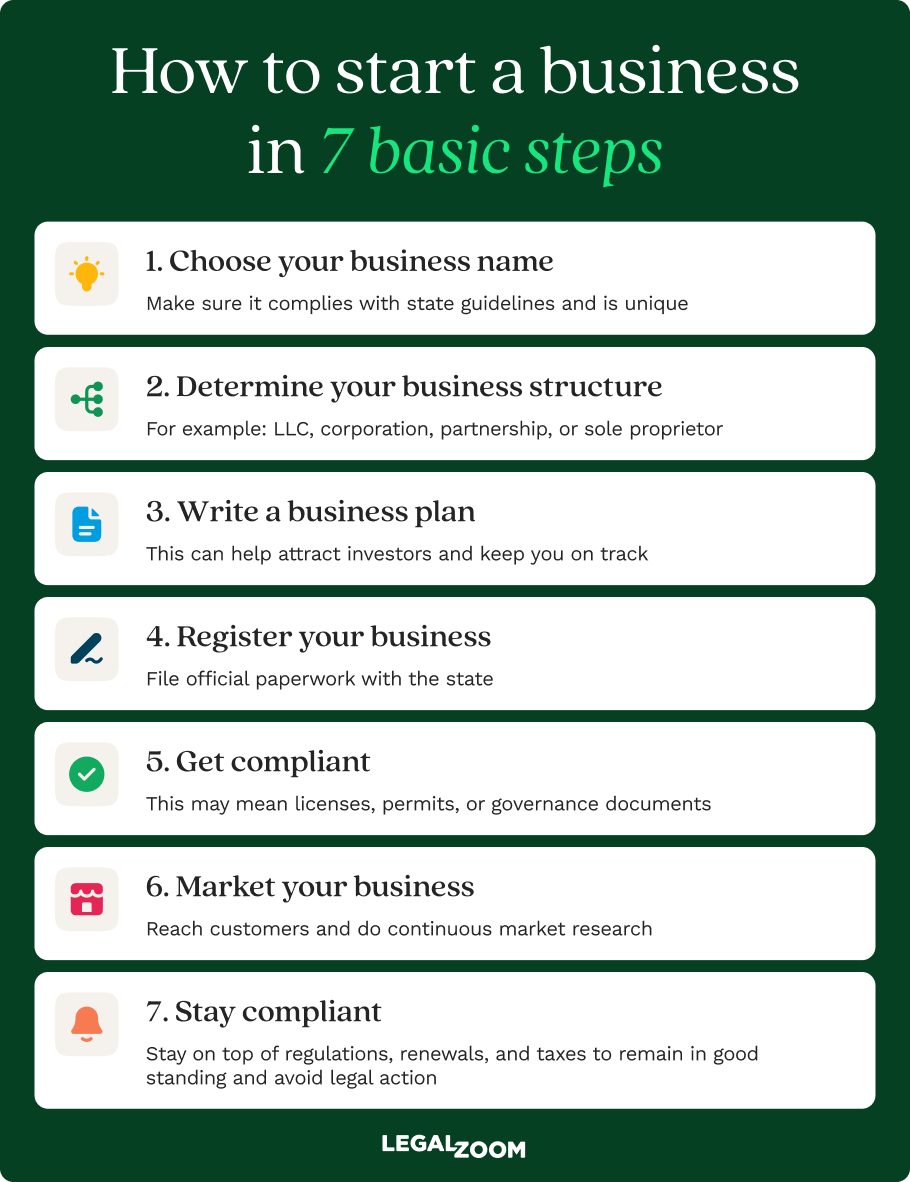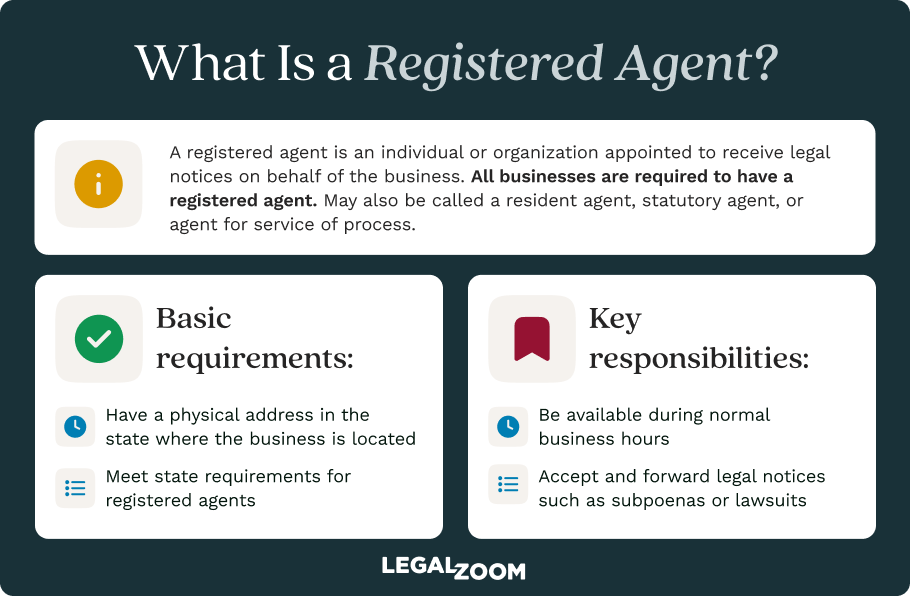One of the first challenges for a new business owner is choosing the right entity structure. A limited liability company (LLC) is often the ideal choice for small business owners because they offer personal liability protection while providing flexible tax options and lower operating costs. This is especially true in Alabama, where the cost of doing business is low and business-friendly regulations exist to help foster local entrepreneurship.
Whether you’re looking to start a business in Birmingham, Gulf Shores, or beyond, use this guide as your reference for every step in the LLC formation process. Learn where to file, critical state requirements, and how to start and run your business in compliance with Alabama laws.
The basics of Alabama LLCs
Similar to a corporation, an LLC is its own legal entity. This adds credibility to the business and provides limited liability protection to its owners. In other words, the business owners’ personal assets generally aren’t affected by business debts and liabilities.
On the other hand, LLCs also resemble sole proprietorships in that they allow for more operational flexibility and are pass-through entities by default. This means that LLCs can “pass” their gains and losses through to the owners’ personal income tax returns instead of being subject to business-level taxation. This is a nice perk in Alabama, where the individual income tax rate is between 2% and 5%, and the corporate tax rate is 6.5%.
Besides the benefits that automatically come when you form an LLC, Alabama offers other unique advantages:
- Broad range of incentives such as tax credits and grant programs
- Workforce training
- Strong business climate
- Resources for small businesses
- Diverse industries
- Low operating costs
How to start an Alabama LLC in 7 steps
Starting an LLC in Alabama might seem daunting, but the process can be broken down into several actionable steps. The main thing you need to do is file formation paperwork with the Alabama Secretary of State Business Entities Division. This document is called a certificate of formation in Alabama, and may also be referred to as “articles of organization.”
If you want help navigating the process, LegalZoom’s LLC formation service can do most of the heavy lifting for you, from filing the paperwork to guiding you through next steps. Whether you do it yourself or use a formation service to complete the process, review the steps below so you know what to expect along the way.

Step 1: Choose and reserve a name for your Alabama LLC
Before you can file a certificate of formation for your LLC, you need to reserve your business name with the Secretary of State. Alabama requires businesses to provide a name reservation certificate along with their certificate of formation.
Make sure your business name complies with Alabama's naming requirements:
- Your business name must include the words “Limited Liability Company,” “LLC,” or “L.L.C.”
- It must be distinguishable from existing business names in the state.
- The name can’t imply that your company conducts business that it isn’t legally allowed to conduct. For example, it can’t falsely imply association with a government agency.
- Regulated industry words like “bank,” “lawyer,” “engineer,” “credit union,” “insurance,” etc. require formal approval from the relevant authority.
Start by conducting an Alabama business search to check if the name is available. The Secretary of State website has an online database of registered business names, but you can also use LegalZoom’s free business name search tool below.
Free Alabama Business Name Check
Use our free name check tool to search the Alabama Secretary of State database and see if your business name is available.
By clicking "Check Availability," I agree to LegalZoom's Terms of Use. This search is a preliminary check of state databases and does not include variations or trademarks. Results do not guarantee name availability or compliance with legal requirements.
Note that federal trademarks take legal precedence over registrations with the Secretary of State, so you should also conduct a trademark search before registering your name. LegalZoom offers a free trademark search for exact matches to federal trademarks, plus a comprehensive trademark search to identify additional potential conflicts.
Once you’ve ensured that your LLC name is available, submit a Name Reservation Request Form to the Secretary of State and pay the $25 fee. You can file online or mail the completed application to the address listed on the form. Non-subscribers that file online and use a credit card pay a $28 fee instead.
If you’re not quite ready to file your certificate of formation, no problem. A Name Reservation Certificate is good for up to one year.
Step 2: Choose your registered agent
LLCs in Alabama must appoint and maintain a registered agent. This is the person or entity that receives service of process (such as lawsuits) and other official documents and notices on behalf of your LLC.

An LLC member or employee can act as the LLC’s registered agent, but you can also hire someone to do the job for you. This takes the responsibility off your or your employee's plate and offers some added privacy and flexibility.
According to Alabama law, registered agents must meet the following criteria:
- Be a domestic or foreign entity that is registered to do business in the state, or an individual who is a resident of Alabama
- Have an office with a physical street address in Alabama (a P.O. box is not sufficient)
- Be available at the registered office to accept documents during regular business hours
Remember: Your registered agent’s office address will be available as part of public record. LegalZoom's registered agent service offers increased privacy with its own Huntsville street address. We will also scan your documents for virtual access from anywhere and remind you about upcoming compliance deadlines to help keep your LLC in good standing.
Step 3: Prepare and file a certificate of formation
The certificate of formation is a document that officially establishes your LLC by laying out basic information about it. To prepare your certificate, you'll need the following information:
- Your LLC name
- A copy of your name reservation certificate
- The name and address of the LLC's Alabama registered agent
- The county where the registered office is located
- If you’re forming a special type of LLC, specify which typeThe type of LLC (series LLC, professional LLC, or nonprofit LLC)
- The effective date of LLC, if different from the certificate of formation filing date (can’t be more than 90 days from the filing date)
- The signature of the organizer
Gather the information you need and fill out the certificate of formation form and file it, either online or by mail, with the Secretary of State. The filling fee is $200. If you file by mail, send two copies of the completed form in a self-addressed envelope to the following address:
Secretary of State, Business Services
P.O. Box 5616, Montgomery
Alabama 36103
The Alabama Secretary of State will review the LLC filing. If the certificate is approved, the LLC becomes a legal business entity and the Secretary of State’s office will issue you a certificate that confirms that it formally exists. Keep this document somewhere safe because it will allow your LLC to obtain a federal tax ID, business licenses, and business bank accounts.
Step 4: Create an operating agreement
Alabama doesn’t require an operating agreement, but it’s an essential component of your business that outlines the way your LLC will operate. Having a readily accessible, written operating agreement can help settle internal disputes, protect your personal assets from potential business-related litigation, and set standard operating procedures.
For example, if internal disputes arise, without an agreement in place, the courts make judgements based on state laws and guidelines for settlement, regardless of any verbal agreements or understandings LLC members may have had.
Here’s some essential information that your operating agreement should include:
- LLC name and principal address
- Member information and ownership percentages
- Capital contributions
- Profit and loss distribution
- Management structure (member-managed vs. manager-managed)
- Voting rights and decision-making procedures
- Procedures for admitting new members and dismissing outgoing members
- Dissolution procedures
- Indemnification and liability clauses
If you’re not sure how to get started, LegalZoom can help you create an operating agreement that meets both Alabama laws and your LLC’s specific needs. This service is also included in both of our paid LLC formation packages.
Step 5: Get an employer identification number (EIN)
A federal EIN is a nine-digit ID that the IRS assigns businesses for tax purposes. Not all LLCs need an EIN, but multi-member LLCs, single-member LLCs taxed as a corporation, or all LLCs that have or plan on hiring employees do.
Even if you’re a single-member LLC taxed as a sole proprietorship, you may choose to get an EIN to help protect your sensitive information. This is because you can use an EIN instead of your Social Security number on legal and financial documents.
Regardless of how your LLC is structured, an EIN can help you do the following:
- File and manage taxes at the state and federal levels
- Open a business bank account
- Hire employees
- Apply for business licenses (if needed)
You can apply for your EIN by mail, fax, or online. You can also let LegalZoom handle it for you.
Starting a business takes courage. LegalZoom makes sure the legal details don’t stand in your way, from the day you register until the day you retire.

Step 6: Open a business bank account
Once you have your EIN, you can use it to open a business bank account. This is an important step to help keep your business and personal finances separate and track your LLC’s income and expenses. To open a business account, most financial institutions require the following:
- EIN
- Formation documents, like a copy of your certificate of formation
- Proof of identification for account holders, like a driver’s license or passport
- Information about your LLC, including its member information and operating agreement
Most banks will also want to see an operating agreement.
Step 7: File a Business Privilege Tax return
Don’t skip this step! LLCs must file an annual Alabama Business Privilege Tax return with the Alabama Department of Revenue. This tax is for the privilege of existing as a legal entity and doing business in Alabama. You'll need to file the Initial Privilege Tax Return (Form BPT-IN) within 2.5 months of registering your LLC. Then, every year thereafter for the duration of the LLC, you will file the annual Privilege Tax Return (Form PPT).
All Business Privilege Tax returns must include the following documents (plus any additional LLC forms):
- One copy of pages 1 to 5 of the federal tax return (if no federal tax return is included, a copy of the balance sheet and income statement are required)
- A copy of Alabama apportionment schedule Form 65
- Documentation to support exclusions and/or deductions claimed
- A copy of the balance sheet used to compute the taxpayer's net worth
Note: If your calculated business privilege tax is $100 or less, you’re not required to file a Business Privilege Tax Return.
Next steps after forming your Alabama LLC
Now that you’ve formed your LLC, it’s important to maintain compliance with local and federal regulations. This includes applying for any necessary business licenses and permits, registering for taxes, and maintaining records.
Keep certain LLC records on-site
Alabama LLCs must keep certain records at its registered office or principal office for its members. This list includes, but is not limited to, the following:
- The most current list of names and recently updated addresses of all the LLC members
- A copy of the filed certificate of formation, along with any amendments and executed powers of attorney for action(s) already taken
- A copy of the effective operating agreement and any amendments
- Copies of financial statements from the past three years
- Copies of federal, state, and local tax returns and reports from the past three years
Register for Alabama state taxes
Most businesses will also need to register with the Alabama Department of Revenue through its online portal, My Alabama Taxes. This is where you’ll file state taxes and returns.
Exactly which taxes you’ll need to file depend on your business activities and size. For example, there are several industry-specific taxes that may or may not apply to your business. Here are a few common taxes for small businesses:
- Sales and use tax. Businesses that sell or lease tangible goods or certain services will need to pay this tax. The sales tax rate varies based on the goods or services you provide. These businesses will also need a sales tax licence.
- Withholding tax. This is for employers who need to withhold taxes from employee wages.
- Unemployment compensation tax. Employers should also register with the Department of Labor. This tax is due on the first $8,000 given to each employee during a calendar year.
These are just a few possible requirements, but a CPA or business attorney can give you more specific advice on which taxes apply to your company.
Get necessary business licenses
In addition to the sales tax license, virtually all businesses in Alabama will need to obtain a Business Privilege License in every county in which they operate. The license you need depends on your industry and the type of business your LLC conducts. The Alabama Department of Revenue has a helpful Quick Reference Guide that you can use to help determine which licenses you need based on your business activities.
Additionally, you may need to obtain city or state permits or professional licenses to operate your LLC in Alabama. Generally, you’ll need to obtain professional licenses from the relevant agency that regulates that industry. The Alabama Department of Revenue also has a helpful chart of regulatory bodies to check which industries require them.
If you need help understanding which licenses or permits you need, LegalZoom’s business license and permit service can create a customized summary of the federal, state, and local licenses and permits you may need, as well as details about each and helpful instructions for completing the applications.

Ongoing compliance requirements for Alabama LLCs
As of January 1, 2024, Alabama LLCs no longer need to file an annual report. However, they must file an annual Business Privilege Tax return, which is due at the time of the business’ federal return. The amount you’ll pay is based on your LLC’s net worth apportioned to the state, with rates ranging from $0.25 to $1.75 for each $1,000. The minimum tax is $50.
Another annual filing requirement for LLCs in Alabama is the Business Privilege License, which needs to be renewed every year in the county in which your business operates. These licenses expire on September 30 each year, and renewals are due by October 31. Check with your local jurisdiction to understand what the renewal fees are for your specific Business Privilege License(s). Overdue renewals face a 15% penalty plus interest.
The cost of forming an LLC in Alabama
The total cost of starting an LLC in Alabama will depend on a number of factors, including your business purpose, location, and operating costs. That said, here is a breakdown of the basic costs to form an Alabama LLC:
- Name Reservation Certificate: $25 to $28 depending on your subscription (one-time fee)
- Certificate of formation: $200 by mail, $208 online (one-time fee)
- Operating agreement: $99 and up (optional one-time fee)
- Registered agent service: $100 to $300 annually (optional)
- Business privilege tax: $50+; total rate depends on LLC’s net worth (annual fee)
- Business licenses: Varies depending on type of business, industry, and county (annual fees)
- Foreign LLC registration: $150 by mail, $156 online in Alabama (one-time fee); fees vary in other states
You will need to pay at least around $275 when forming an LLC in Alabama.
How to start your Alabama LLC with LegalZoom
While it's possible to start an LLC without assistance, legal guidance can make each step stress free and give you peace of mind about your compliance. If you think you can benefit from some support, we’ve got you.
LegalZoom simplifies your LLC formation process by conducting an Alabama entity search to ensure that your desired name is available. Then, we compile all of the necessary state documentation and register your LLC so you can start growing your business instead of getting bogged down in paperwork. Plans start at $0 + state filing fees.
If you’re planning to DIY your formation, LegalZoom has a suite of independent services to supplement your entrepreneurship. To help you manage your business operations and keep it in good standing, we offer registered agent services and help with a variety of compliance needs. For innovators looking to protect their brand and ideas, we also offer trademark, copyright, and patent filing services.
Start an LLC in Any State
LegalZoom can help you file your state's formation paperwork for as little as $0 + state filing fees.

FAQs about Alabama LLCs
What are the benefits of registering an LLC?
There are many benefits of registering an LLC, including protection from personal liability, flexible tax structures and profit distributions, and management flexibility. They also involve less paperwork and fewer ownership restrictions than corporations.
Do I need a business license for my Alabama LLC?
Yes, all businesses in Alabama, including LLCs, need to obtain a Business Privilege License from each county in which they conduct business. Additional licenses may also be needed. The type of license will vary depending on the industry, county, and type of business conducted. Some LLCs will also need to get permits or professional licenses.
What's the difference between an EIN and a business license?
An EIN, or employer identification number, is a nine-digit ID that the IRS assigns businesses for federal tax purposes. A business license refers to several different licenses that your LLC may need to perform a certain activity or operate in a certain area. Various business licenses exist at the federal, state, and local levels.
How long does it take to form an LLC in Alabama?
Forming an LLC in Alabama should only take up to several business days, depending on if you file your certificate of formation online or by mail and the volume of applications that the Secretary of State is processing. Other aspects of getting an LLC may add to the total amount of time, such as conducting an Alabama LLC search and creating an operating agreement.
How do I correct filing errors in Alabama?
If there is an error on your certificate of formation filing, you can correct it by filing an amendment with the Alabama Secretary of State, which costs $100.
Can I change my LLC name after filing?
Yes, you can change the name of your LLC after filing by submitting an LLC amendment form for an $100 filing fee. You can also look into getting a DBA if you just want to market your business under a new name.
What happens if I miss the Business Privilege Tax deadline?
If you miss the Business Privilege Tax deadline, you’ll receive a Business Privilege Tax Delinquent Notice and may risk the state beginning the steps to dissolve your business.
How do I dissolve an LLC in Alabama?
To dissolve an LLC in Alabama, first, ensure that you follow the procedures outlined in your operating agreement. Then, you’ll need to file articles of dissolution with the Secretary of State, which costs $100. Also, make sure that you pay any outstanding business taxes and cancel business licenses. To make the process easier, let LegalZoom's dissolution services ensure everything is filed efficiently and correctly.
Kathleen Crampton and Rudri Bhatt Patel contributed to this article.




